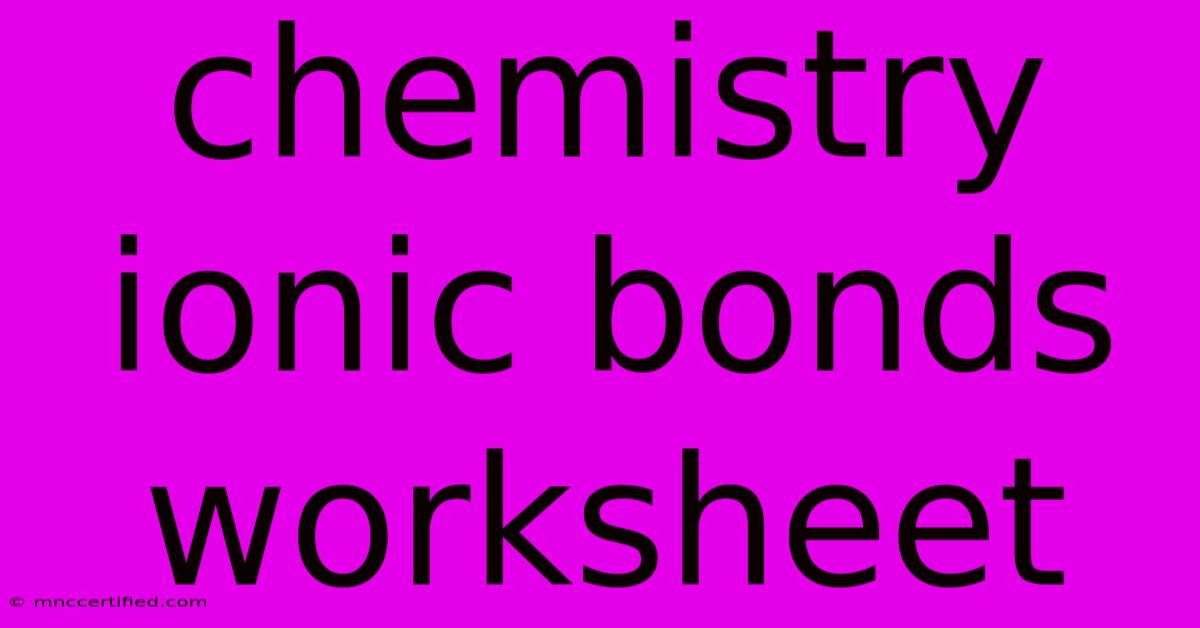Chemistry Ionic Bonds Worksheet

Table of Contents
Conquer Chemistry: Mastering Ionic Bonds with Worksheets
Are you struggling to grasp the concepts of ionic bonds in chemistry? Do you need a reliable resource to test your understanding and solidify your knowledge? Then you've come to the right place! This article will guide you through the intricacies of ionic bonding, provide tips for using chemistry ionic bonds worksheets effectively, and offer resources to help you ace your next chemistry exam.
Understanding Ionic Bonds: The Basics
Ionic bonds are a fundamental concept in chemistry, representing the electrostatic attraction between oppositely charged ions. These ions are formed when atoms either gain or lose electrons to achieve a stable electron configuration, often resembling that of a noble gas. This process, called ionization, creates cations (positively charged ions) and anions (negatively charged ions). The strong electrostatic force between these oppositely charged ions forms the ionic bond.
Key Characteristics of Ionic Bonds:
- Electrostatic Attraction: The primary force holding ions together is the strong electrostatic attraction between positive and negative charges.
- Electron Transfer: Ionic bonds are formed through the complete transfer of electrons from one atom to another.
- High Melting and Boiling Points: Ionic compounds generally have high melting and boiling points due to the strong electrostatic forces between ions.
- Crystalline Structure: Ionic compounds typically form a regular, crystalline structure in the solid state.
- Solubility in Water: Many ionic compounds are soluble in water, where water molecules can surround and separate the ions.
- Conductivity: Ionic compounds conduct electricity when molten or dissolved in water because the ions are free to move and carry charge.
Utilizing Chemistry Ionic Bonds Worksheets: A Step-by-Step Guide
Worksheets are invaluable tools for reinforcing learning and mastering concepts. Here's how to effectively use chemistry ionic bonds worksheets:
-
Understand the Concepts First: Before tackling any worksheet, ensure you have a solid grasp of the fundamental principles of ionic bonding. Review your textbook, class notes, or online resources.
-
Start with the Basics: Begin with worksheets that cover foundational concepts like identifying ions, predicting ionic formulas, and understanding electron transfer. Gradually increase the difficulty level as you gain confidence.
-
Practice Regularly: Consistent practice is key. Work through several worksheets, focusing on different aspects of ionic bonding.
-
Analyze Your Mistakes: Don't just focus on getting the right answers. Carefully review any incorrect answers to identify where you went wrong and understand the underlying concepts.
-
Seek Help When Needed: If you encounter difficulties, don't hesitate to seek help from your teacher, tutor, or classmates. Understanding the concepts is far more important than simply getting the answers right.
-
Use Online Resources: Supplement your worksheets with online resources such as interactive simulations, videos, and practice quizzes. Many websites and educational platforms offer excellent resources for learning chemistry.
Keywords for Optimal Search Engine Ranking
To ensure your worksheet or article about ionic bonds ranks well in search engine results, strategically incorporate relevant keywords. Here's a list to get you started:
- Ionic bonds
- Chemistry ionic bonds
- Ionic bonding worksheet
- Chemistry worksheet ionic bonds
- Ionic compound worksheet
- Cations
- Anions
- Electrostatic attraction
- Electron transfer
- Ionic formula
- Chemical bonding
- High melting point
- Solubility
- Conductivity
Beyond the Worksheet: Expanding Your Knowledge
While worksheets are excellent for practice, remember that chemistry is a multifaceted subject. Explore various learning resources to gain a holistic understanding:
- Interactive Simulations: Many online resources provide interactive simulations that visually demonstrate ionic bonding.
- Educational Videos: YouTube and other platforms offer numerous educational videos explaining ionic bonds in a clear and engaging manner.
- Study Groups: Collaborating with peers can enhance understanding and provide different perspectives on challenging concepts.
By diligently utilizing worksheets, expanding your knowledge through diverse resources, and implementing effective SEO strategies, you'll be well on your way to mastering ionic bonds and achieving success in your chemistry studies. Remember, consistent effort and a proactive approach to learning are crucial for mastering any scientific concept.

Thank you for visiting our website wich cover about Chemistry Ionic Bonds Worksheet. We hope the information provided has been useful to you. Feel free to contact us if you have any questions or need further assistance. See you next time and dont miss to bookmark.
Featured Posts
-
Conor Mc Gregor Rape Case Jury Verdict
Nov 23, 2024
-
Conor Mc Gregor Rape Case Verdict
Nov 23, 2024
-
Watch F1 Vegas Gp 2024 Online Free
Nov 23, 2024
-
Wagners Missed Fts Impact Lakers Game
Nov 23, 2024
-
Black Rock Fund Capital Plan Approved
Nov 23, 2024